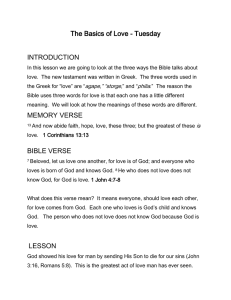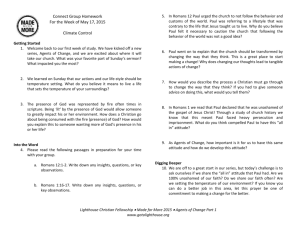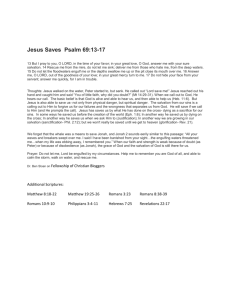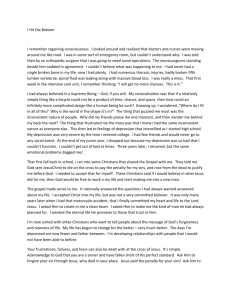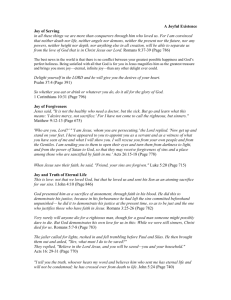Basics of Love
advertisement
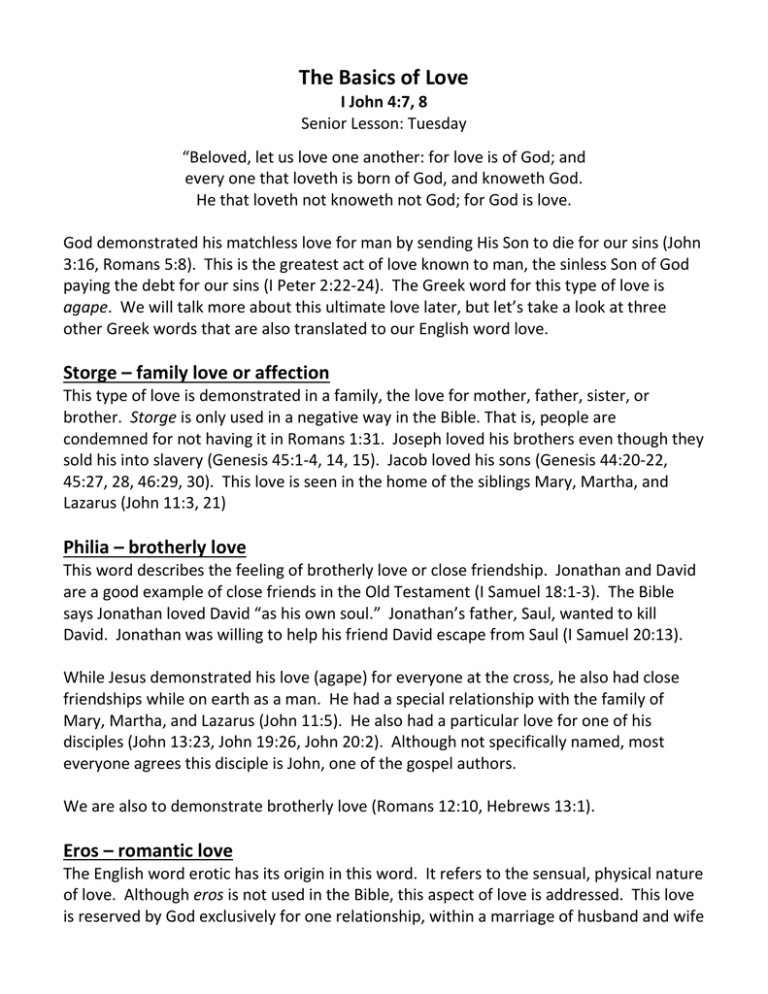
The Basics of Love I John 4:7, 8 Senior Lesson: Tuesday “Beloved, let us love one another: for love is of God; and every one that loveth is born of God, and knoweth God. He that loveth not knoweth not God; for God is love. God demonstrated his matchless love for man by sending His Son to die for our sins (John 3:16, Romans 5:8). This is the greatest act of love known to man, the sinless Son of God paying the debt for our sins (I Peter 2:22-24). The Greek word for this type of love is agape. We will talk more about this ultimate love later, but let’s take a look at three other Greek words that are also translated to our English word love. Storge – family love or affection This type of love is demonstrated in a family, the love for mother, father, sister, or brother. Storge is only used in a negative way in the Bible. That is, people are condemned for not having it in Romans 1:31. Joseph loved his brothers even though they sold his into slavery (Genesis 45:1-4, 14, 15). Jacob loved his sons (Genesis 44:20-22, 45:27, 28, 46:29, 30). This love is seen in the home of the siblings Mary, Martha, and Lazarus (John 11:3, 21) Philia – brotherly love This word describes the feeling of brotherly love or close friendship. Jonathan and David are a good example of close friends in the Old Testament (I Samuel 18:1-3). The Bible says Jonathan loved David “as his own soul.” Jonathan’s father, Saul, wanted to kill David. Jonathan was willing to help his friend David escape from Saul (I Samuel 20:13). While Jesus demonstrated his love (agape) for everyone at the cross, he also had close friendships while on earth as a man. He had a special relationship with the family of Mary, Martha, and Lazarus (John 11:5). He also had a particular love for one of his disciples (John 13:23, John 19:26, John 20:2). Although not specifically named, most everyone agrees this disciple is John, one of the gospel authors. We are also to demonstrate brotherly love (Romans 12:10, Hebrews 13:1). Eros – romantic love The English word erotic has its origin in this word. It refers to the sensual, physical nature of love. Although eros is not used in the Bible, this aspect of love is addressed. This love is reserved by God exclusively for one relationship, within a marriage of husband and wife (Matthew 19:4-6). Male and female are joined together in marriage. The man leaves his father and mother to cleave to his wife and become one flesh with her. While God’s intension is for this love to be shared only by husband and wife, the devil uses the desires of men and women to tempt them to experience this love outside of marriage. Those who yield to this temptation (fornicators) “shall not inherit the kingdom of God” (I Corinthians 6:9, Galatians 5:19-21). Follow God’s plan by sharing this love with one and only one person in your life, your spouse after your marriage. Agape - charity As was mentioned at the beginning, God demonstrated His love for sinful man by sending his Son as a sacrifice for the sins of the world (John 3:16, Romans 5:8). Man did not deserve such a sacrifice. We should be required to pay the price for our sins, death (Romans 6:23, James 1:14, 15). Fortunately, because of God’s love and grace (Romans 5:20, 21) our debt was paid with the blood of Christ. God extended this gift of love to all. Many have accepted it, but more have rejected it (Matthew 7:13, 14). The unconditional nature of agape is the unique characteristic of this form of love. It is extended to someone in need without thought of receiving anything in return. Consider that Jesus told us to “love your enemies” in Matthew 5:43-48. An enemy would be someone you would prefer to not be around. He would be outside your circle of close friends. You will not go to the movie with your enemy. You will have lunch with your enemy. You will not call or text your enemy to keep up with what is going on in his life. However, if your enemy really needs your help, Jesus says we should be ready to “do good to them.” Paul has a similar message in Romans 12:19-21 and Galatians 6:9, 10. As Christians, we should have this love in our hearts (Romans 5:5) and be ready to put it into action. Jesus told his disciples to “love one another” (John 13:34, 35). John said we should be ready to demonstrate the selfless sacrificial nature of agape “in deed” and not in word only (I John 3:16-18). Remember the old adage: actions speak louder than words. This love holds us together as the body of Christ (Ephesians 4:15, Colossians 3:1214, I John 4:16-21). Discussion 1. Make sure you have read the verses from the section on family love. What are some things that are the same about each example of love (Joseph, Jacob, etc.)? 2. Make sure to read the verses on brotherly love. What city in Pennsylvania is based on this word for love? Who else was a very close friend to Jesus? 3. Study the verses on the section on romance. Why do you think your parents are concerned about who you might date? Not everyone is interested in romance, discuss Matthew 19:10-12 4. Boys, is it wrong to desire your wife? Girls, is it wrong to desire your husband? List some advantages of marriage: 5. What is the most famous chapter on Love in the Bible? 6. What is the greatest act of love ever? Application 1. List some words that are very similar to love: example – friendship 2. List some words that man has changed to mean love, or uses in the wrong way: example – lust 3. Work together to try and come up with a good definition for “love.” Discuss your definition with your teacher. Love is ___________________________________________________________ ___________________________________________________________ 4. Sing some songs about love. 5. If you make a new friend at camp, you have shown love and done a good deed. Who do you plan to befriend?
